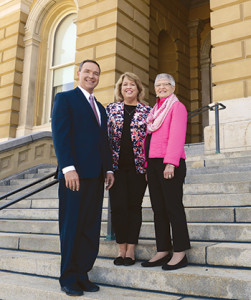
State Sen. Jeff Danielson co-chairs No Labels in Iowa, along with former Lt. Gov. Joy Corning (right). Peggy Huppert (middle) is the bipartisan organization’s state executive director.
Written by Joe Gardyasz
Photo by Duane Tinkey
During the Iowa State Fair last August, amid eating deep-fried food on a stick and seeing the butter cow, nearly 6,000 fairgoers stopped by a booth with the banner “No Labels” above it and signed up in support of the national movement. The nonprofit initiative was launched in 2010 with the lofty goal of moving Congress and the federal government beyond partisan bickering to begin addressing a set of national goals that both parties could agree upon.
Iowans’ involvement in the fledgling organization could prove to be a crucial part of No Labels’ campaign to build awareness of its strategy for ending the cycle of gridlock in Washington. After gaining some traction in Washington, D.C., in the past several years, the organization is now gearing up to engage caucus goers in Iowa and primary voters in New Hampshire this fall.
Having thousands of Iowans say they want to be part of No Labels “is validation that there is a demand for this conversation,” says Iowa Sen. Jeff Danielson, a Democrat from Cedar Falls who co-chairs No Labels in Iowa. “We have now built that (interest) into a leadership committee that numbers about 70 Iowans today; we hope to expand that. Those are significant opinion leaders in communities all around Iowa.”
Co-chairing the Iowa organization with Danielson are former state Sen. Maggie Tinsman, a Republican, and former Iowa Lt. Gov. Joy Corning, also a Republican. In March, the organization hired a state executive director, Peggy Huppert of Des Moines, who eight years ago led Iowans for Sensible Priorities, a campaign to reform the federal budget process.
No Labels is about creating a shared
vision so Democrats and Republicans can end the
cycle of winner-takes-all politics.
No Labels was created by former Utah Gov. Jon Huntsman, a Republican, and U.S. Sen. Joe Manchin of West Virginia, a Democrat, on the premise that Democrats and Republicans can unite around big goals that resonate with all Americans, regardless of their political party. One of No Labels’ most significant accomplishments has been to establish a bipartisan caucus of “Problem Solvers,” made up of about 80 members of Congress who meet regularly to help build trust across the aisle.
Cooperation fostered by No Labels has led to 17 bills that have been written and co-sponsored by the Problem Solvers, among them the No Budget, No Pay bill that became law in 2013. Two members of Iowa’s congressional delegation, freshman Sen. Joni Ernst and Rep. Dave Loebsack, have signed on to No Labels so far.
“No Labels is certainly making inroads in Washington, but it’s tough, very tough,” Huppert says. “Several prominent No Labels leaders, including Jon Huntsman, Evan Bayh and Joe Lieberman, have all run for president, so they’re all very familiar with the outsize impact of things that go on in Iowa and New Hampshire. … So they decided that this is a completely open presidential race and a great opportunity to raise our visibility with the candidates and the media, and to use Iowa and New Hampshire as kind of laboratories in the development of our leadership group.”
No Labels says it’s all about creating a shared vision—what they call a “National Strategic Agenda”—so that Democrats and Republicans can end the cycle of winner-takes-all politics and begin focusing on ways to achieve those goals. The policy plan, which the national organization is fleshing out this year, will be built on four key goals:
- Create 25 million new jobs over the next 10 years.
- Secure Medicare and Social Security for another 75 years.
- Balance the federal budget by 2030.
- Make America energy-secure by 2024.
No Labels’ leaders in Iowa are neither starry-eyed optimists nor political neophytes, Danielson says. “We believe that to break out of those labels, you’ve got to have an overall theory that matters for our overall economy and the growth and leadership most Americans assume we should be doing,” he says. “That’s why those four topics are what we’re focused on.”
There are too many interest groups and other variables in our political process that are pushing people away from each other, which prevents members from opposite parties from communicating, Danielson adds. “So No Labels is taking a broad view of what problem-solving is,” he says. “If you say to us that you’re willing to commit to those four items of the National Strategic Agenda and work meaningfully on trying to work across party lines, then you’re in. We don’t care what other people are trying to label you as; that’s the point. We want to be the space of comfort and ideas, without guilt by association.”
“The goal is to have Iowa be the most informed electorate in the country.” -Iowa Sen. Jeff Danielson
Corning recently signed on to No Labels’ Iowa leadership group at Danielson’s invitation. “As I looked at the four goals, I thought, ‘Who could disagree with any of those?’ ” she says. “We’re a bipartisan organization, and in fact it is appealing to both Republicans and Democrats. I am hoping that the time has come; I think people are so fed-up with government not working. It’s time for Congress to get its act together.”
Tinsman, who is also a newcomer to No Labels this year, says she likes the fact that the organization is taking the same approach of using civility as 50-50 in 2020, the women’s political leadership mentoring group whose board she co-chairs. “It means there’s probably more than one way to solve the problem, but you have to cooperate with people who may not think like you,” she says.
Huppert most recently worked as senior market manager for the American Cancer Society’s Iowa chapter, and from 2008 to 2012 was Iowa government relations director for the organization. During the 2008 caucuses, she led a staff of 12 for Iowans for Sensible Priorities, a million-dollar awareness campaign that attracted about 12,000 supporters who participated in the Iowa caucuses.
Raising money won’t consume the efforts of No Labels’ Iowa volunteers because the funding is all coming from money raised by the 501(c)(4) nonprofit organization at the national level, Huppert says. “Certainly, we hope that if this really resonates with people in Iowa and they believe in it, they will contribute,” she says. “But we don’t have to raise lots of money.”
In less than a year, No Labels–Iowa has grown from its from its initial 6,000 State Fair supporters to about 9,000 contacts across the state, Huppert says. “We’re going to be aggressively adding to the leadership group to start with,” she says. “Those people tend to all go to their caucus anyway. We’re going to start with educating and getting people excited about No Labels, and then we’re going to ask them to take that knowledge and excitement with them to their caucus.”
The state organization also has established student chapters at Iowa State University, the University of Iowa and the University of Northern Iowa, as well as at Drake University and Cornell College, Huppert says. Those five Iowa chapters are part of more than 100 student chapters that No Labels has organized so far nationwide.
Danielson says No Labels’ meeting forums could range from small gatherings at local libraries to regional town hall meetings. “We’re open to different techniques of how to engage people, but it will be all small-group meetings where people can engage civilly, because that’s what our caucus process encourages,” he says.
“The goal is to have Iowa be the most informed electorate in the country,” Danielson adds. “They will know the facts behind those four goals, and they will also know some policy choices that will get us there. To me, that’s the benefit of democracy—learning all of those things together, and electing leaders who can take up those ideas and do something about them with a broader-based support than the current campaigns allow us to do because of the competing special interests.”
Overcoming cynicism will be the biggest challenge, Huppert believes. Often, when discussion turns to fixing gridlock in Washington, you can practically see people’s shoulders sink an inch or two in resignation, she says: “When people hear about the National Strategic Agenda, they’re like, ‘Yeah, of course those are things we need to address.’ But there’s often a knowledge gap about how we can do that. So part of what we want to do is get people talking about … them. You don’t have to be a policy expert to have an informed-enough opinion as a citizen.”
For more information about No Labels and to get involved, visit NoLabels.org/tags/Iowa.







